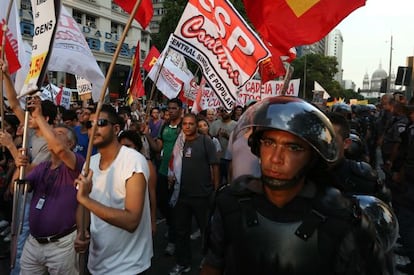Homophobic former Brazilian officer wants to lead human rights panel
Jair Bolsonaro’s candidacy seen as ruling party's apathy toward rights issues

A former military officer, who has come under fire for his homophobic remarks and support of the death penalty in Brazil, stands in line to become the next chairman of the Human Rights and Minorities Committee in Congress.
Jair Bolsonaro, a member of the Progressive Party (PP), is hoping to replace the outgoing controversial chairman, Marco Feliciano, an evangelist preacher of the Social Christian Party (PSC), who is openly racist and homophobic.
Past reluctance by the Workers Party (PT) to take over the committee is seen by some minority groups as apathy by the ruling political group when it comes to human rights issues. But Bolsonaro’s candidacy is being viewed as a political ploy designed to pressure the PT to give up the chairmanship of the Mines and Energy Committee, which the PP is thought to be after. Under the current makeup in Congress, the PT has the right to three of the 21 groups.
This political maneuver was confirmed by Bolsonaro in a recent interview with EL PAÍS, in which he also expounded on his views on gays in Brazil, poverty and introducing capital punishment.
Bolsonaro has the support of evangelical groups across the country. But after he made his statements, the PT began discussing ways to keep him from taking over from Feliciano. The appointments to the different committees were to take place over the next few days but that task has since been postponed.
“Bolsonaro’s candidacy reveals the parties’ neglect of a committee that deals with sensitive issues,” said political analyst António Augusto Queiroz.
If [Bolsonaro] had kept quiet he would have probably won”
Queiroz believes that Bolsonaro’s candidacy will eventually fall through because of his predecessor’s tenure. “The strategy that the PP created is actually having a chilling effect; the parties are now reacting. If [Bolsonaro] had kept quiet he would have probably won, but his statements have distanced him from being the candidate.”
These statements included gems such as calling President Dilma Rousseff “a terrorist,” and proposing cuts in social assistance to poorer people to keep them from having more children. He also said that the majority of homosexuals become gay because of drugs or through association.
Since the Human Rights and Minorities Committee was created in 1995, its past chairs have been members of Brazil’s leftist parties.
“It accidently fell into Feliciano’s lap during the last distributions of committees,” Queiroz said. “The majority of the parties chose the commissions they are interested in, and then they continue to select alternatively. The PT [which has the majority in Congress] choses first, then comes the Brazilian Democratic Movement [PMDB] and then the PT again, followed by a medium-sized party.
“The PT had four opportunities to select, and was in position to choose the Human Rights Committee, but it didn’t.”
Lúcia Nades, chairman of the NGO Human Rights Links, explained that the committee is very important because it functions as a legislative go-between for minority groups and lawmakers. “At a time when thousands of people are taking to the streets demanding basic rights, it doesn’t make sense for the committee to be chaired by a person who doesn’t share the same values.”
While many sectors continue to protest the possibility of a Bolsonaro candidacy, the controversial deputy continues to give incendiary interviews in the media.
Tu suscripción se está usando en otro dispositivo
¿Quieres añadir otro usuario a tu suscripción?
Si continúas leyendo en este dispositivo, no se podrá leer en el otro.
FlechaTu suscripción se está usando en otro dispositivo y solo puedes acceder a EL PAÍS desde un dispositivo a la vez.
Si quieres compartir tu cuenta, cambia tu suscripción a la modalidad Premium, así podrás añadir otro usuario. Cada uno accederá con su propia cuenta de email, lo que os permitirá personalizar vuestra experiencia en EL PAÍS.
¿Tienes una suscripción de empresa? Accede aquí para contratar más cuentas.
En el caso de no saber quién está usando tu cuenta, te recomendamos cambiar tu contraseña aquí.
Si decides continuar compartiendo tu cuenta, este mensaje se mostrará en tu dispositivo y en el de la otra persona que está usando tu cuenta de forma indefinida, afectando a tu experiencia de lectura. Puedes consultar aquí los términos y condiciones de la suscripción digital.









































